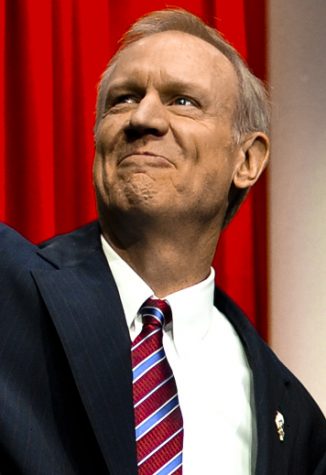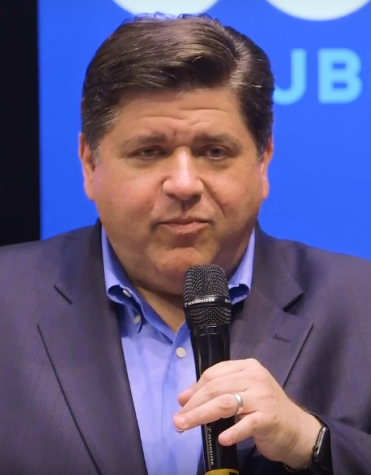The one education issue Rauner and Pritzker agree on
October 9, 2018
Republican Gov. Bruce Rauner would veto a bill to restore an elected school board in Chicago, while his Democratic challenger J.B. Pritzker would sign it.
 Lealan C. Buehrer
Lealan C. Buehrer
Rauner would extend the reach of a controversial $100 million tax credit scholarship “to a billion” dollars if he could, while Pritzker would curtail the new program, which diverts public tax dollars to tuition at private schools for some 5,600 Illinois students.
But plowing more money into public education — from early childhood through college — came up as a rare point of agreement in back-to-back candidate conversations Chalkbeat Chicago conducted in partnership with WBEZ 91.5 FM.
 Click on the audio below to hear each candidate explain his position on some key education issues facing the state.
Click on the audio below to hear each candidate explain his position on some key education issues facing the state.
When it comes to K-12 funding, predictably, Rauner and Pritzker each told us that relying on property taxes isn’t the answer. Rauner said he’d look for a temporary freeze on property taxes in effort to “shock the system” while his opponent would roll them back.
But put simply, neither had an immediate solution to plugging the massive gap between the $8.4 billion Illinois spends on K-12 public schools and projections of what adequate school funding would cost. A 2017 overhaul in the formula Illinois uses to fund schools put the state on a 10-year path to closing the estimated $6.8 billion gap. But it’s never been clear how Illinois — which is staring at an even bigger backlog of bills from its two-year budget impasse — is supposed to free up more money.
Currently, 713 of Illinois’ nearly 850 districts are funded below the “adequacy targets” established in the formula, which tries to even the playing field for districts that don’t collect much through property taxes, or those like Chicago, Rockford, and Peoria that predominantly serve low-income students.
Rauner said he has added $400 million to early childhood education and K-12 schools this year, and plans to find additional funding for subsequent years by wringing enough savings from his revamp of the state’s Medicaid program. He said he’d also plug the gap by growing the state’s tax base through aggressive business recruitment.
After standing his ground during a rocky budget impasse and seeing his support wane, “what I’ve certainly learned is that change needs to be incremental,” Rauner told us.
“Every year we’re going to put hundreds of millions of dollars more into our education system. I’m reversing decades of damage, decades of inequitable funding, and the way to do it is a combination of making government more efficient and, most importantly, by getting our economy to grow faster. We can expand our tax base rather than our tax rates and have much more money.”
He said in a pre-interview questionnaire the state has already saved $500 million by revamping Medicaid; however, the office that manages the program says it can’t provide an estimate since the state isn’t even a year in. He did not elaborate on that point in the interview.
 By Chi Hack Night (YouTube) , via Wikimedia Commons
By Chi Hack Night (YouTube) , via Wikimedia Commons
Pritzker, meanwhile, has traveled the state touting a progressive income tax that would wring more from wealthy residents and less from people in middle- and low-income brackets. But even if such a plan were to pass through the Legislature, it would require a state referendum — a process that would take until at least 2020.
In the short term, Pritzker said in the Chalkbeat/WBEZ interviews that he’d look to legalizing sports betting and recreational marijuana while working on a plan to reduce incarceration.
“You’d have to get some of those things passed in the first legislative session to see revenue,” he acknowledged. “But in order for us to change the way we fund schools, I want to remind you that, in the average state in the United States, about half the money comes from property taxes and about half comes from state taxes. But we’re at about 25 percent from the state and 75 percent from property taxes. We need to directionally head toward 50-50.”
Here’s what the candidates said about other key education topics.
School choice
The candidates’ diverging views on school choice include charters as well as the tax-credit scholarship program squeezed into the school funding bill last year without public debate. Rauner saying he’ll personally contribute “more and more” of his own millions to the program. A WBEZ report found that 28 percent of the students in the first wave to benefit from the bill were not considered low-income, as the program had been described.
That didn’t budge Rauner: “I’d like to have a billion-dollar program, but we’ve got to start somewhere,” he said. “We started with $100 million — let’s expand it every year. This is a great community effort to increase support for our low-income parents who deserve options.”
Pritzker, meanwhile, said he’d wind down the program and put a moratorium on charter growth, even though he supports the concept of “choice” in districts such as Chicago, where students can choose between neighborhood schools, test-in schools, magnets, and charters.
Asked if he would curtail the authority of a state charter commission established to work as an appellate body for denied proposals, he demurred, saying that there are good charter schools “worthy of support” but that adequate funding for district schools should come before “expanding the opportunity for people to start charters.”
This past spring, Rauner vetoed a bill that would have curbed the commission’s authority.
Teacher shortage
A new state report sounds the alarm over a dire teacher shortage, particularly in rural areas and in bilingual and special education.
Rauner said the answer to the teacher shortage is not raising salaries — he vetoed a bill that would have set a minimum teacher salary at $40,000 — but rather sending more state money that districts can use for raises if they choose.
“One size does not fit all,” said Rauner, who also pointed to his record on easing restrictions on out-of-state teachers coming into Illinois. “We cannot look at cost structure and teacher compensation in Chicago and compare it to a tiny rural district with a very low cost of living and very limited resources and say you have to pay what’s in Chicago.”
On the contrary, Pritzker said he’d support a minimum wage bill for teachers. He also confront the shortage issue by examining the state’s existing teacher-prep opportunities and investing more in higher education. He was mum on whether he’d support eliminating a basic-skills test for licensing — one idea that has recently resurfaced as state education leaders consider options for recruiting more mid-career candidates to classrooms.
Early childhood education
Both candidates have deep ties to early childhood education efforts, with Rauner’s wife, Diana, steering the advocacy group Ounce of Prevention, and Pritzker supporting through his philanthropy the national Early Childhood Innovation Accelerator as well as Ounce of Prevention and the First Five Years Fund.
Rauner touted his record on raising early childhood funding and pushing for quality standards across the web of private and public providers who receive state dollars. Asked about a change in eligibility requirements that knocked tens of thousands of families off of public child care assistance programs, Rauner blamed the budget impasse and said, if elected, he’d work in a new term to bring in even more funding.
“You touched on some damage done during the budget impasse, that was all of us in elected office letting down young people in the low-income families in this state,” he said. “It shouldn’t have happened; it was completely unnecessary.”
Pritzker, meanwhile, has put out an early childhood plan that would, in his words, pave a path to universal 3- and 4-year-old preschool — something no other state has been able to fully execute. Asked why he’d shift scarce resources toward something so pricey, while also allocating more money toward the K-12 funding gap, he said it was a down payment on a continued investment.
“Over the course of a kid’s education, they are way more likely to graduate from high school, way more likely to graduate from college, to get a job, and less likely to get incarcerated when they get quality preschool and child care. Let’s not cut off our nose to spite our face.”
Originally posted on Chalkbeat by Cassie Walker Burke on October 2, 2018
Chalkbeat is a nonprofit news site covering educational change in public schools.



















